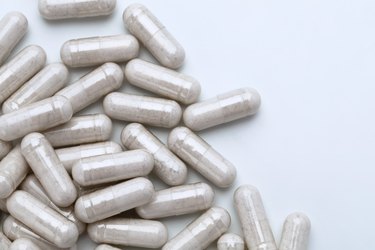
Your gut contains trillions of bacteria that keep you healthy by digesting food, preventing infection and boosting your immune system. When good and bad bacteria become imbalanced, probiotic supplements or probiotics foods can help give you the good bacteria you need to get things right again.
But even though you might know probiotics are good for you, the question of how often to take probiotics remains. Although there are general daily recommendations, it does depend on why you're taking them. Always talk to your doctor or a qualified nutrition professional for specific recommendations.
Video of the Day
Video of the Day
Daily Probiotic Supplements
There's no one-size-fits-all approach to probiotics. While there are general guidelines for how often you should take probiotics, the right amount of time and the right dosage may be different for you.
That being said, a report in an August 2017 issue of American Family Physician does provide some recommendations for how many probiotics you should take and how often. Researchers from the report found that a dose of at least 5 billion colony-forming units, or CFUs, per day was more effective than lower dosages. Harvard Health Publishing notes that you should take this in just one dose per day.
However, the effectiveness of the probiotics depends on the delivery method, like a capsule versus yogurt, and what type of probiotics, or bacterial strains, you're taking. How effective probiotics are also depends on the condition you're trying to correct.
The duration of probiotic supplementation — or how long you should take them — also depends on the condition. For example, the same report in the American Family Physician notes that if you're taking probiotics for constipation, you should take them as long as symptoms persist, but if you are taking them for ulcerative colitis, you should continue taking them for at least one to two weeks after the resolution of a flare-up.
To maximize effectiveness, take your probiotic with a meal or shortly after eating. If you miss a day on your daily probiotic regimen, you do not need to double up. Instead, just begin again the next day. You can get your daily dose through probiotic supplements or from probiotics foods, like yogurt, kimchi, sauerkraut and kombucha.
Read more: 13 Surprising and Beneficial Probiotic Foods
Probiotics Side Effects
While both probiotic supplements and probiotic foods are considered safe, there is a possibility that you'll experience side effects while taking them, especially in the beginning. Upset stomach, bloating, gas and diarrhea are common (and usually mild) side effects that resolve fairly quickly, according to the Cleveland Clinic.
If symptoms become too uncomfortable, you can reduce your dosage until they subside and then try slowly increasing to the full dosage of 5 billion CFUs — or your doctor's specific recommendation — per day.
There are some people, however, that shouldn't take probiotics. If you have a weakened immune system or you're going through chemotherapy treatment, you should avoid probiotics as they can cause an infection in your body. If you've recently had surgery, you should also use probiotics with caution and always make sure to get clearance from your surgeon first.
The National Center for Complementary and Integrative Health also notes that since probiotics aren't closely regulated, some of them may contain ingredients and bacterial strains that are different than what's listed on the label. If probiotics are contaminated, it could pose other health risks. Because of this, it's vital to get your probiotics from a reputable source like a health food store. You can also get probiotics directly from a high-quality supplement manufacturer, rather than online on discount sites.